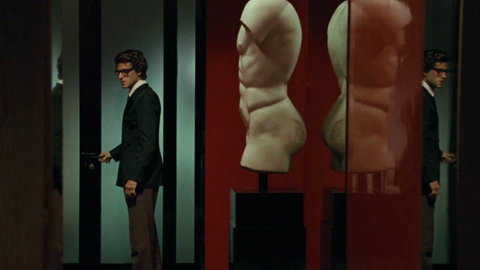By Violet Lucca in the May-June 2017 Issue

Frame to Frame: Nocturama
In the final scene of Nocturama, the state’s brutal logic is fulfilled
Viewers of Nocturama are unlikely to forget the film’s use of pop songs, from Willow Smith’s “Whip My Hair” (ironic commentary on the action) to Shirley Bassey’s “My Way” (an emotional expression of a young terrorist’s feelings of manic triumph) to Blondie’s “Call Me” (an aural opiate that they’re powerless to resist dancing to). But perhaps the most important musical cue is John Barry’s driving, Moog-heavy theme to the 1971-72 British TV series The Persuaders!, which helps announce the endgame of the film’s final minutes. These scenes chart the young terrorists’ downfall as police storm the mall in which they’ve been hiding out, with overlapping editing that synthesizes the film’s two halves, one inspired by Gus Van Sant’s Elephant, the other by Dawn of the Dead.

From the May-June 2017 Issue
Also in this issue
After David (Finnegan Oldfield) and André (Martin Petit-Guyot) see on the mall’s televisions that the police know their location, they agree not to tell anyone else and go their separate ways. While scoping out the exits, André runs into Fred (Robin Goldbronn), who asks him: “Frankly, man to man, isn’t this look totally wild?” (Fred’s still wearing the makeup his comrade Sabrina playfully applied earlier, and a bronze metallic bathrobe.) André simply murmurs “Fantastic,” and goes down one flight as the music begins. He sees a charcoal-gray cat in hunting mode underneath a designer sofa and Samir (Ilias Le Doré) practicing ninja moves with a kitchen knife; suddenly, there’s some unintelligible shouting and the popping of a gun off screen. We cut to David silently getting down on one knee, proposing to girlfriend Sarah (Laure Valentinelli) as the Persuaders! theme begins again and is interrupted by the same gunfire we just heard. The riot police arrive on the floor, entering through a plastic construction sheet; Jean-Claude (Luis Rego) and Patricia (Hermine Karagheuz), the homeless couple invited to join in the crew’s consumer free-for-all, putter around a stuffed zebra; and then we see André and Fred’s exchange again, this time from over André’s shoulder. André walks away, and the music plays as Fred wanders over to a bed, flops down, and points his toy gun at the ceiling in a theatrical, diva-like gesture. We then finally witness the source of the commotion we’ve heard repeated when Fred is shot through the heart by the SWAT team as they shout “Police! Drop the gun!” He falls, and his body rests like Jesus in a pietà, but without a Mary to hold him.
Jean-Claude freezes upon hearing the shot, and then is shot himself. The narrative, which had been momentarily stuck in a time loop of Fred’s death, tentatively begins to move forward again. Patricia screams. Sarah and David run and hide as the lights shut off. The camera backs away from Jean-Claude in an elegant tracking shot, and we see (or hear) him fired upon again from multiple angles. These shots are interspersed with reactions from the other characters as they realize that they’ve been caught. The music ends on a minor note, sadly dwindling away as they desperately seek cover (one ironically inside a running shoe display), a counterpoint to the thrumming synth beats that comprise the majority of the song.

Each vantage point on Fred’s demise conveys its own aesthetic. André, followed by a flowing Steadicam shot as he darts around, rides a thriller vibe; lovers David and Sarah are framed in tender profile, gripping each other like it’s a romance about the last hours of Pompeii; Fred’s in a glam-rock musical. In all cases, the victims appear in the center of the frame, as if the camera is the sights that’s being trained on them. The innocence that they’ve so desperately tried to hide with the bluster of rap and pop, consumerism, and violent acts comes tragically, unavoidably to the fore at this moment.
The sequence shatters the cozy comfort (and boredom) this luxury goods paradise had given these characters. To paraphrase Chris Marker’s narration in A Grin Without a Cat: they did something that made the (formerly invisible) state push back, and nothing around them can stop it. They are utterly unprepared to deal with a SWAT team; they are reduced to animals, hiding in the dark. (The cat André glimpses was not a sign of unluckiness, but of a predatory force imminently upon them.) The false sense of safety is created by having so much stuff at their disposal, and is as intoxicating as the music itself.




